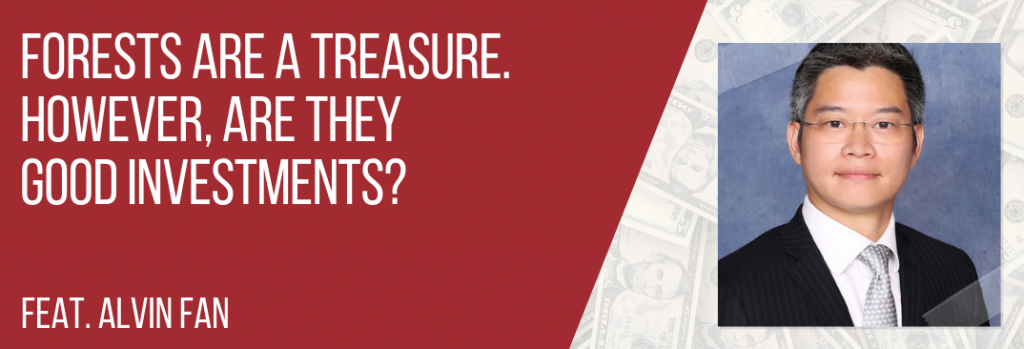Ep34: Alvin Fan – Forests Are a Treasure. However, Are They Good Investments?

Listen on
Apple | Overcast | Stitcher | Spotify | Other
Guest profile
Alvin Fan is the Chief Executive Officer of OP Investment Management, one of Asia’s leading hedge fund platforms focusing on emerging managers. Part of the Oriental Patron Financial Group running assets of over USD 10 billion primarily in private equity, OPIM separately partners with emerging hedge fund managers with assets collectively more than $750 million across 25 managers. Having worked in Asia since 2000, Alvin has over 15-years’ experience in Strategy and Investment Management – from Private Equity to Publicly Listed Funds overseeing assets across Asia & Eastern Europe. Enjoys working with entrepreneurs and growing fund managers across Asia. He is forever a student of business strategy, innovations, and the pursuit of greatness.
In today’s episode, Alvin Fan shares the story of the teak timberland investment in Costa Rica that he was pursuing. Based on his investment thesis, teak falls to the ‘good investment’ metric- are real assets, nationally appreciate over time, exponential rate or return. But the returns are just one side of the performance coin, on the other side are other risks like country risk, marketability and the tedious work involved in monitoring and management of the plot lands where the teak are planted.
Listen from his story and learn about the specific risks involved when considering investing in timberland and know what you need to do to avoid doing same mistakes Alvin did.
“Every mistake is a golden opportunity to learn. And the value of that lesson is immeasurable. It really does pay forward.”
Alvin Fan
Topics Covered:
00:54 – Alvin Fan’s professional and investment background
07:57 – Sharing his teak timberland investment in Costa Rica, the projection of its high-yielding return
11:04 – This timberland investment checked off all the ‘good investment’ metrics, are real assets, nationally appreciate over time, exponential rate or return
11:53 – The different risks he and his team had to go through every time that they needed to do their due diligence
13:25 – What’s in their pitch book they present to the Asian investors
15:08 – Thoughts of his two uncles who are known as the grandfathers of the private equity industry in Asia about his timberland investment
16:21 – Importance of due diligence and due diligence follow-ups in this type of private equity direct investments and the accountability that is needed to answer the different questions from the investors
23:28 – Andrew’s takeaways from Alvin’s experience
27:14 – Alvin’s investment advice to listeners: At the end of the day, investing is a serial condition. Just as is being an entrepreneur. It means that you just keep going. And at some point, it will get better. Just make sure that you’re alive when it does.
Main Takeaways:
Lesson 1: “Investors are going to be demanding a level of due diligence that in some cases are nigh impossible. When it comes to private equity direct investments and you have to be prepared to not only answer these questions but to be accountable for these questions.”– Alvin Fan
Lesson 2: “If I’m selling a product to an individual based on the fact that they don’t know enough to ask, is this the type of investment I really should be selling? Is this the type of investment that I should be getting into?”– Alvin Fan
Lesson 3: “Starting a business means selling to bloody strangers.”– Alvin Fan
Lesson 4: “The product itself has to stand on its own and it didn’t. Because of all of those questions about execution, about risk, and about certainty. We didn’t even get into the weather risk, into the country risk, and all of those other it’s simply Alvin. How often are you going to check up on my bloody trees?”– Alvin Fan
Lesson 5: “There is initial due diligence and then there’s a regular follow up particularly on an alternative asset such as something related to agriculture and basically hedge fund managers are not necessarily good farmers and good farmers are what you really need in this type of case to prevent things from getting damaged from weather and crops and all that.”– Andrew Stotz
Lesson 6: “Have clear metrics and almost like price actions if you will. If the budget hits a certain point and you see that there’s no reasonable course or no good reason for it. And as well as no recourse, you have to cut it and you have to fund as quickly as possible.”– Andrew Stotz
Resources:
Connect with Alvin Fan:
Andrew’s books
- How to Start Building Your Wealth Investing in the Stock Market
- My Worst Investment Ever
- 9 Valuation Mistakes and How to Avoid Them
- Transform Your Business with Dr.Deming’s 14 Points
Andrew’s online programs
- Valuation Master Class
- Women Building Wealth
- The Build Your Wealth Membership Group
- Become a Great Presenter and Increase Your Influence
- Transform Your Business with Dr. Deming’s 14 Points

